Rheim Alkadhi, Harvest of Flames, 2019, industrial transport tarpaulins, metal hardware. Photo by Christiane Schmidt, courtesy the artist.
Templates for Liberation is the UK’s first exhibition of artist Rheim Alkadhi. Addressing ongoing consequences of war and colonialism in present-day Iraq and the region at large, this exhibition presents sculptures, archival documentation, and emancipatory counter-histories. The ICA’s main gallery will feature a series of sculptures fabricated from the heavy-duty transport tarpaulins of cross-border industrial vehicles. These sculptures bear the traces of their transnational passage; the material itself embodies the environmental and sociopolitical violence consuming the region. The adjacent reading room offers archival and speculative reference points for thinking about Iraq’s colonial borders, resource extraction, and the ensuing practices of biometric categorisation that would exploit ethnic differences for decades to come. Alkadhi conceives of this exhibition as a material template for a set of liberatory encounters: to re-imagine global space—and our agency in our short-term inhabiting of it—proposing ways of refusing the violence and injustice that characterise our times.
Sculptures made from tarpaulin lie directly on the floor, unfurl in piles, line the walls and drape from the ceiling. Alkadhi has a long engagement with this material, typically polyester fabric bonded with polyvinyl chloride (PVC), which speaks to the artist’s interests: its fossil-fuel origins and traversals across borders attest to a specific ecological and political reality; and the raw tarp material has an agency of its own. Iraq, where the artist lived as a child, is the world’s fifth largest oil and petroleum producer, and the industry has had devastating environmental effects. The tarps in the exhibition have been salvaged from transport lorries, those that ubiquitously cross state and national borders with an ease denied to migrants criminalised at the same crossings. Additionally, the material is physically recalcitrant, it can be formed, but only to a degree. The work we encounter in the gallery is of an exchange between the artist, the material, and the life the material has lived.
The adjacent gallery is transformed into a reading room space entitled The Land and the People that sets the tone for a colonial context where place and people enclosed by colonial borders. Representations of critical documents, correspondence, and governmental agreements relate to the establishment of the modern-day political borders in Iraq, drawn by the British and French c. 1916-1923. The early colonial lens on the people of Iraq is exemplified through the inclusion of a publication series begun in 1935, The Anthropology of Iraq which indexes anthropometric data, including comparative measurements of body parts, racialised categorisations, and photographs of people identified only by number. The study, conducted by Henry Field, emphasises an enduring geopolitical link between Britain and the US in the region. Its data supplied Franklin D. Roosevelt’s top-secret ‘M’ project, designed to identify potential resettlement areas (’M’ for migration) for the millions expected to be displaced by WWII in ‘under-populated’ regions in North Africa and the Middle East.
Alongside these historic records, Alkadhi seeds another narrative: the presence of a speculative rebel element emerges from inside the reading room materials, accompanied by related documents. Photographic portraits of these rebels reclaim representation, imagining countless unrecorded insurgencies by nonconforming women, racialised and ethnic minorities, workers, communists, and others. The rebels exist outside of time, defy categorisation, and bring an anti-colonial strategy into the present.
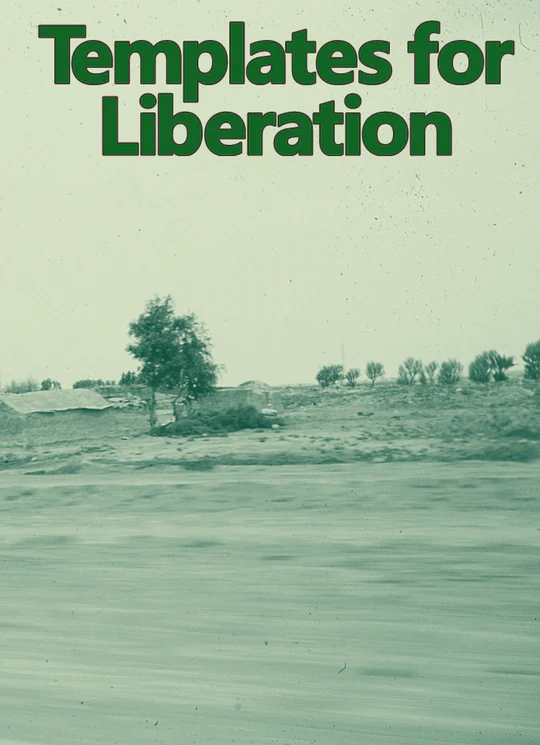
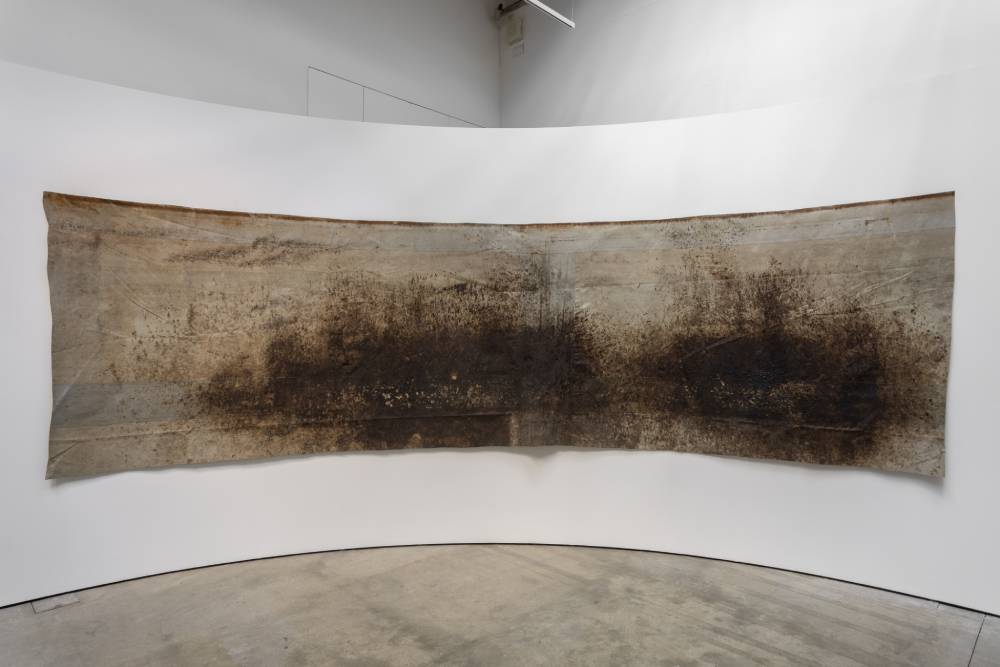
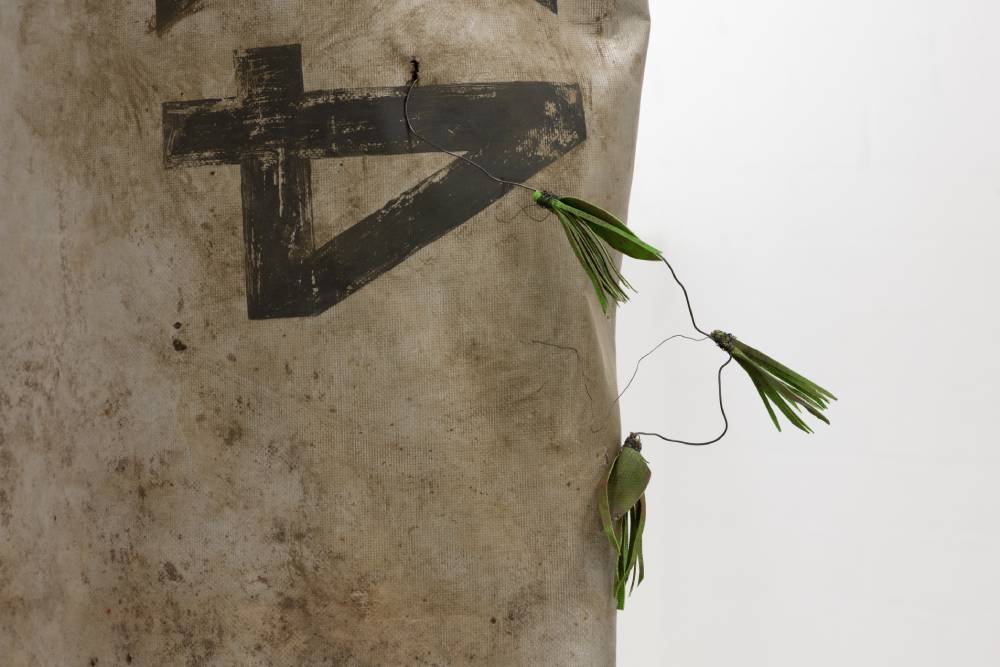
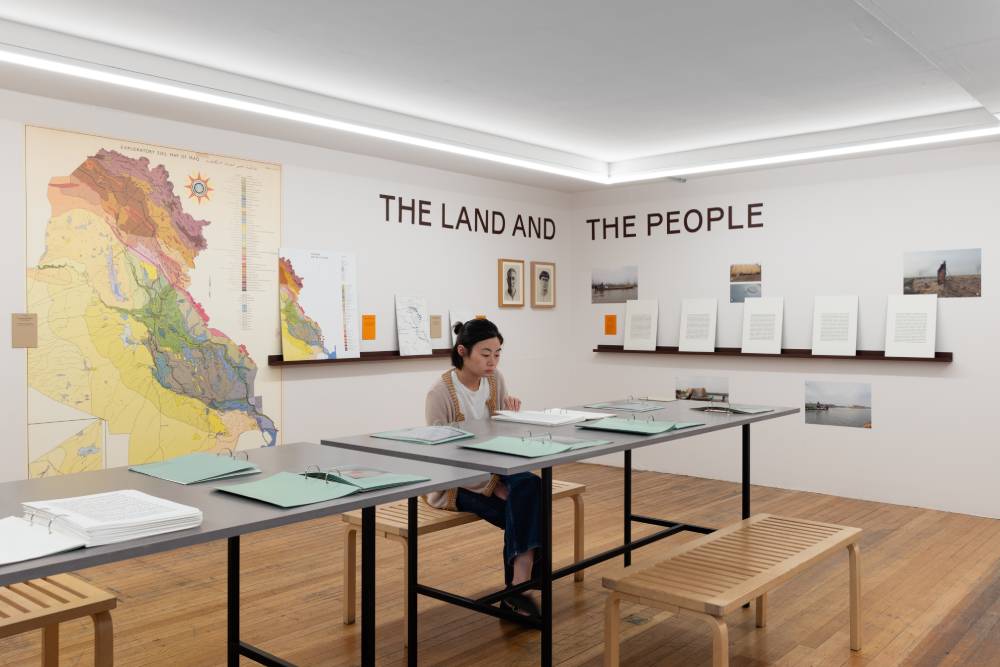
Sculptures made from tarpaulin lie directly on the floor, unfurl in piles, line the walls and drape from the ceiling. Alkadhi has a long engagement with this material, typically polyester fabric bonded with polyvinyl chloride (PVC), which speaks to the artist’s interests: its fossil-fuel origins and traversals across borders attest to a specific ecological and political reality; and the raw tarp material has an agency of its own. Iraq, where the artist lived as a child, is the world’s fifth largest oil and petroleum producer, and the industry has had devastating environmental effects. The tarps in the exhibition have been salvaged from transport lorries, those that ubiquitously cross state and national borders with an ease denied to migrants criminalised at the same crossings. Additionally, the material is physically recalcitrant, it can be formed, but only to a degree. The work we encounter in the gallery is of an exchange between the artist, the material, and the life the material has lived.
The adjacent gallery is transformed into a reading room space entitled The Land and the People that sets the tone for a colonial context where place and people enclosed by colonial borders. Representations of critical documents, correspondence, and governmental agreements relate to the establishment of the modern-day political borders in Iraq, drawn by the British and French c. 1916-1923. The early colonial lens on the people of Iraq is exemplified through the inclusion of a publication series begun in 1935, The Anthropology of Iraq which indexes anthropometric data, including comparative measurements of body parts, racialised categorisations, and photographs of people identified only by number. The study, conducted by Henry Field, emphasises an enduring geopolitical link between Britain and the US in the region. Its data supplied Franklin D. Roosevelt’s top-secret ‘M’ project, designed to identify potential resettlement areas (’M’ for migration) for the millions expected to be displaced by WWII in ‘under-populated’ regions in North Africa and the Middle East.
Alongside these historic records, Alkadhi seeds another narrative: the presence of a speculative rebel element emerges from inside the reading room materials, accompanied by related documents. Photographic portraits of these rebels reclaim representation, imagining countless unrecorded insurgencies by nonconforming women, racialised and ethnic minorities, workers, communists, and others. The rebels exist outside of time, defy categorisation, and bring an anti-colonial strategy into the present.
From the shop

Exhibition images



Rheim Alkadhi is a visual artist who lives in Berlin, while working internationally. Alkadhi’s feminist practice involves extensive field research around migration, borders, imperialism, ecology and environmentalism, through intimate personal encounters. The artist’s process-based practice thinks through materials on an intimate human scale within specific geopolitical contexts of displacement. Projects have been conducted in Palestine, Lebanon, Iraq, Jordan, Morocco, and along Europe’s borders. Most recently, the solo exhibition Devastation on Your Beautiful Eyes (2022) was presented at Beirut Art Center. Prior to that, the installation Speak, Then, Material Witness, in the Medium of Rebellion! (2022) was presented as ‘embodied curriculum’ for area schools, at Kunstverein Uelzen. Alkadhi was a Guggenheim fellow (2020), and a fellow of the artistic research consortium, Künstlerische Forschung-Berlin (2020/2021). A field study on migrant passage via the island of Lesvos is presented in the film Arrival Points (2021), which has been included in festivals and exhibitions. The artist’s monograph Majnoon Field Guide (Archive Books, 2023) comprises the projects and writings of the past few years.
Photos © Rob Harris
Rheim Alkadhi, For the Oppressed to Narrate the Crimes of Their Oppressors (Devastation Panorama), 2024. Industrial transport tarpaulin, tar residue.
Rheim Alkadhi, To Demilitarize (Disarmed Wing of Hermes UAV M.A.L.E. Drone), 2024. Industrial transport tarpaulin, metal supports and fasteners, paint, reflectors.
Rheim Alkadhi, The Land and the People, 2024. Reading room installation including photographs, text, archival research and publications.
Photos © Rob Harris
Rheim Alkadhi, For the Oppressed to Narrate the Crimes of Their Oppressors (Devastation Panorama), 2024. Industrial transport tarpaulin, tar residue.
Rheim Alkadhi, To Demilitarize (Disarmed Wing of Hermes UAV M.A.L.E. Drone), 2024. Industrial transport tarpaulin, metal supports and fasteners, paint, reflectors.
Rheim Alkadhi, The Land and the People, 2024. Reading room installation including photographs, text, archival research and publications.
04:00 pm
Tue, 11 Jun 2024
Lower Gallery
04:00 pm
Wed, 12 Jun 2024
Lower Gallery
04:00 pm
Thu, 13 Jun 2024
Lower Gallery
04:00 pm
Fri, 14 Jun 2024
Lower Gallery
04:00 pm
Sat, 15 Jun 2024
Lower Gallery
04:00 pm
Sun, 16 Jun 2024
Lower Gallery
04:00 pm
Tue, 18 Jun 2024
Lower Gallery
04:00 pm
Wed, 19 Jun 2024
Lower Gallery
04:00 pm
Thu, 20 Jun 2024
Lower Gallery
12:00 pm
Fri, 21 Jun 2024
Lower Gallery
12:00 pm
Sat, 22 Jun 2024
Lower Gallery
12:00 pm
Sun, 23 Jun 2024
Lower Gallery
04:00 pm
Tue, 25 Jun 2024
Lower Gallery
04:00 pm
Wed, 26 Jun 2024
Lower Gallery
04:00 pm
Thu, 27 Jun 2024
Lower Gallery
12:00 pm
Fri, 28 Jun 2024
Lower Gallery
12:00 pm
Sat, 29 Jun 2024
Lower Gallery
12:00 pm
Sun, 30 Jun 2024
Lower Gallery
04:00 pm
Tue, 02 Jul 2024
Lower Gallery
04:00 pm
Wed, 03 Jul 2024
Lower Gallery
04:00 pm
Thu, 04 Jul 2024
Lower Gallery
12:00 pm
Fri, 05 Jul 2024
Lower Gallery
12:00 pm
Sat, 06 Jul 2024
Lower Gallery
12:00 pm
Sun, 07 Jul 2024
Lower Gallery
04:00 pm
Tue, 09 Jul 2024
Lower Gallery
04:00 pm
Wed, 10 Jul 2024
Lower Gallery
04:00 pm
Thu, 11 Jul 2024
Lower Gallery
12:00 pm
Fri, 12 Jul 2024
Lower Gallery
12:00 pm
Sat, 13 Jul 2024
Lower Gallery
12:00 pm
Sun, 14 Jul 2024
Lower Gallery
04:00 pm
Tue, 16 Jul 2024
Lower Gallery
04:00 pm
Wed, 17 Jul 2024
Lower Gallery
04:00 pm
Thu, 18 Jul 2024
Lower Gallery
12:00 pm
Fri, 19 Jul 2024
Lower Gallery
12:00 pm
Sat, 20 Jul 2024
Lower Gallery
12:00 pm
Sun, 21 Jul 2024
Lower Gallery
04:00 pm
Tue, 23 Jul 2024
Lower Gallery
04:00 pm
Wed, 24 Jul 2024
Lower Gallery
04:00 pm
Thu, 25 Jul 2024
Lower Gallery
12:00 pm
Fri, 26 Jul 2024
Lower Gallery
12:00 pm
Sat, 27 Jul 2024
Lower Gallery
12:00 pm
Sun, 28 Jul 2024
Lower Gallery
04:00 pm
Tue, 30 Jul 2024
Lower Gallery
04:00 pm
Wed, 31 Jul 2024
Lower Gallery
04:00 pm
Thu, 01 Aug 2024
Lower Gallery
12:00 pm
Fri, 02 Aug 2024
Lower Gallery
12:00 pm
Sat, 03 Aug 2024
Lower Gallery
12:00 pm
Sun, 04 Aug 2024
Lower Gallery
04:00 pm
Tue, 06 Aug 2024
Lower Gallery
04:00 pm
Wed, 07 Aug 2024
Lower Gallery
04:00 pm
Thu, 08 Aug 2024
Lower Gallery
12:00 pm
Fri, 09 Aug 2024
Lower Gallery
12:00 pm
Sat, 10 Aug 2024
Lower Gallery
12:00 pm
Sun, 11 Aug 2024
Lower Gallery
04:00 pm
Tue, 13 Aug 2024
Lower Gallery
04:00 pm
Wed, 14 Aug 2024
Lower Gallery
04:00 pm
Thu, 15 Aug 2024
Lower Gallery
12:00 pm
Fri, 16 Aug 2024
Lower Gallery
12:00 pm
Sat, 17 Aug 2024
Lower Gallery
12:00 pm
Sun, 18 Aug 2024
Lower Gallery
04:00 pm
Tue, 20 Aug 2024
Lower Gallery
04:00 pm
Wed, 21 Aug 2024
Lower Gallery
04:00 pm
Thu, 22 Aug 2024
Lower Gallery
12:00 pm
Fri, 23 Aug 2024
Lower Gallery
12:00 pm
Sat, 24 Aug 2024
Lower Gallery
12:00 pm
Sun, 25 Aug 2024
Lower Gallery
04:00 pm
Tue, 27 Aug 2024
Lower Gallery
04:00 pm
Wed, 28 Aug 2024
Lower Gallery
04:00 pm
Thu, 29 Aug 2024
Lower Gallery
12:00 pm
Fri, 30 Aug 2024
Lower Gallery
12:00 pm
Sat, 31 Aug 2024
Lower Gallery
12:00 pm
Sun, 01 Sep 2024
Lower Gallery
04:00 pm
Tue, 03 Sep 2024
Lower Gallery
04:00 pm
Wed, 04 Sep 2024
Lower Gallery
04:00 pm
Thu, 05 Sep 2024
Lower Gallery
12:00 pm
Fri, 06 Sep 2024
Lower Gallery
12:00 pm
Sat, 07 Sep 2024
Lower Gallery
12:00 pm
Sun, 08 Sep 2024
Lower Gallery
Access information
Lower Gallery
- There is a wheelchair-accessible ramp into the Lower Gallery
- We provide Sensory Maps and Large Print Guides, these can be found at the information & sales desk
- Free for visitors where ticket prices are a barrier, please email access@ica.art
- If you have other access requirements, need more info, or want to contact us, go to the Access Page
11 June - 5 September, 2024
Access our Large Print Guide
And our Sensory Map & Script or Sensory Audio
Event Programme
Sat 7 September, 4.30pm
The Marshes + Ma'loul Celebrates its Destruction
Double-bill screening of Kassem Hawal’s 1976 film and Michel Khleifi’s 1984 film.
Past Events
Mon 10 June, 6.30pm
Exhibition Preview
Join us for the opening night of the show.
Wed 19 June, 6pm
Our River...Our Sky + Q&A
A Q&A between artist Rheim Alkadhi and director Maysoon Pachachi follows the screening.
Sat 29 June, 4.30pm
The Hour of Liberation Has Arrived
Screening of the 1974 film by Heiny Srour.
Wed 3 July, 6.30pm
Navigating Ruins, Looking for Liberation
Panel discussion with Kali Rubaii (online), Kanwal Hameed and Laleh Khalili + Q&A
Sat 20 July, 4.30pm
Zooland + Am I the Ageless Object at the Museum? + The Kingdom of Women: Ain el-Hilweh
Triple-bill screenings of Pary El-Qalqili's 2016 film, Noor Abuarafeh’s 2018 film and Dahna Abourahme’s 2010 film.
Sat 3 August, 4.30pm
Films by Ateyyat El Abnoudy
Screening of four of her short films: The Sandwich (1975), Horse of Mud (1971), Sad Song of Touha (1972) and Souk Elcanto (Jumble Sale) (1974).
Sat 24 August, 4.30pm
The Lovers' Wind
Screening of the 1978 film by Albert Lamorisse.
Access our Large Print Guide
And our Sensory Map & Script or Sensory Audio
Event Programme
Sat 7 September, 4.30pm
The Marshes + Ma'loul Celebrates its Destruction
Double-bill screening of Kassem Hawal’s 1976 film and Michel Khleifi’s 1984 film.
Past Events
Mon 10 June, 6.30pm
Exhibition Preview
Join us for the opening night of the show.
Wed 19 June, 6pm
Our River...Our Sky + Q&A
A Q&A between artist Rheim Alkadhi and director Maysoon Pachachi follows the screening.
Sat 29 June, 4.30pm
The Hour of Liberation Has Arrived
Screening of the 1974 film by Heiny Srour.
Wed 3 July, 6.30pm
Navigating Ruins, Looking for Liberation
Panel discussion with Kali Rubaii (online), Kanwal Hameed and Laleh Khalili + Q&A
Sat 20 July, 4.30pm
Zooland + Am I the Ageless Object at the Museum? + The Kingdom of Women: Ain el-Hilweh
Triple-bill screenings of Pary El-Qalqili's 2016 film, Noor Abuarafeh’s 2018 film and Dahna Abourahme’s 2010 film.
Sat 3 August, 4.30pm
Films by Ateyyat El Abnoudy
Screening of four of her short films: The Sandwich (1975), Horse of Mud (1971), Sad Song of Touha (1972) and Souk Elcanto (Jumble Sale) (1974).
Sat 24 August, 4.30pm
The Lovers' Wind
Screening of the 1978 film by Albert Lamorisse.


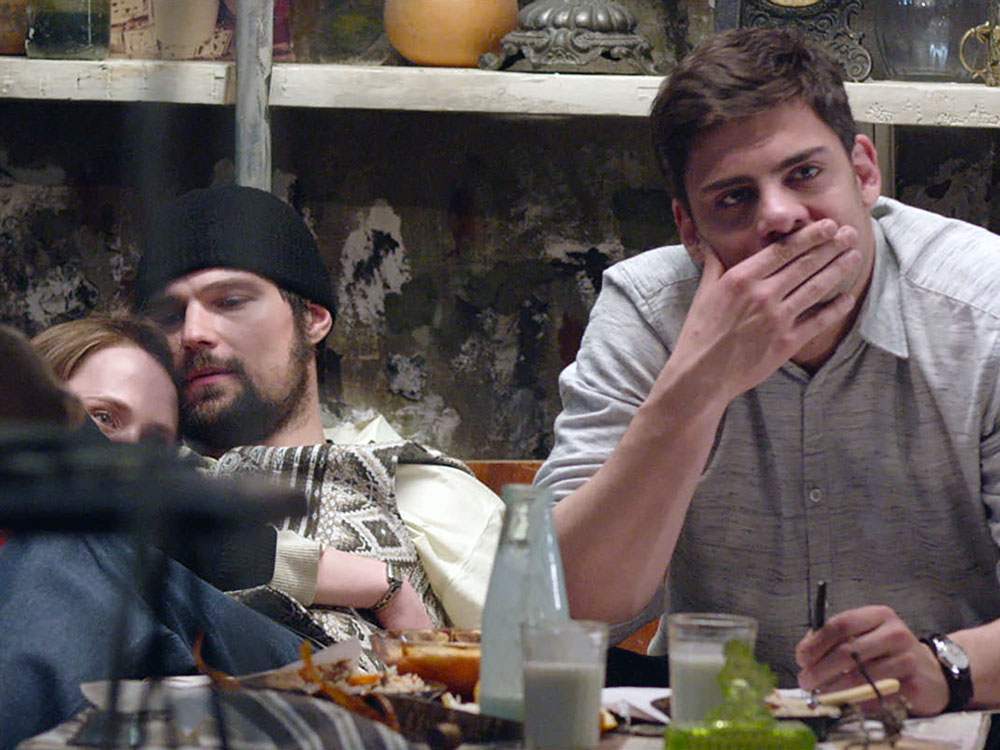








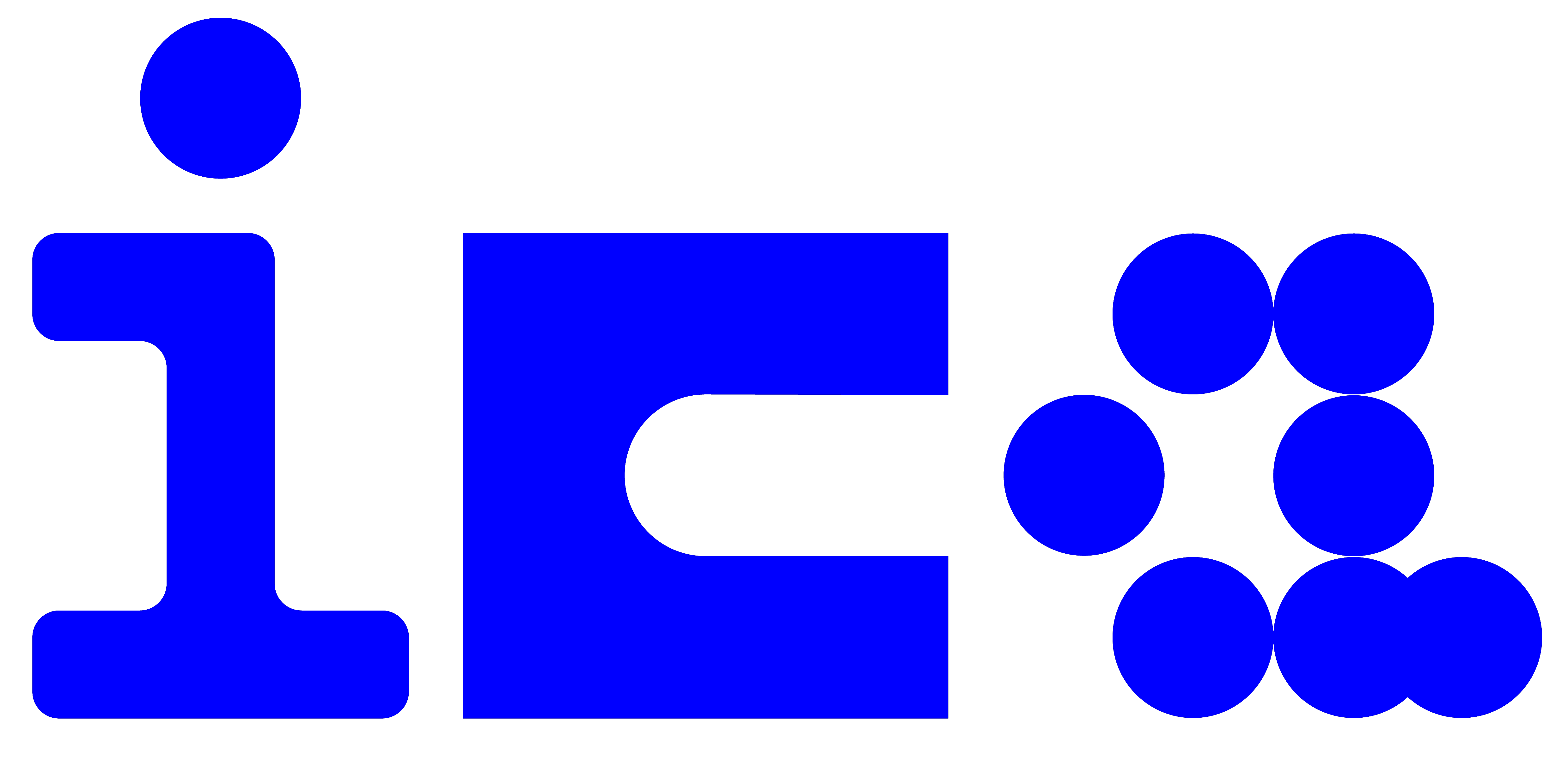
no. 236848.